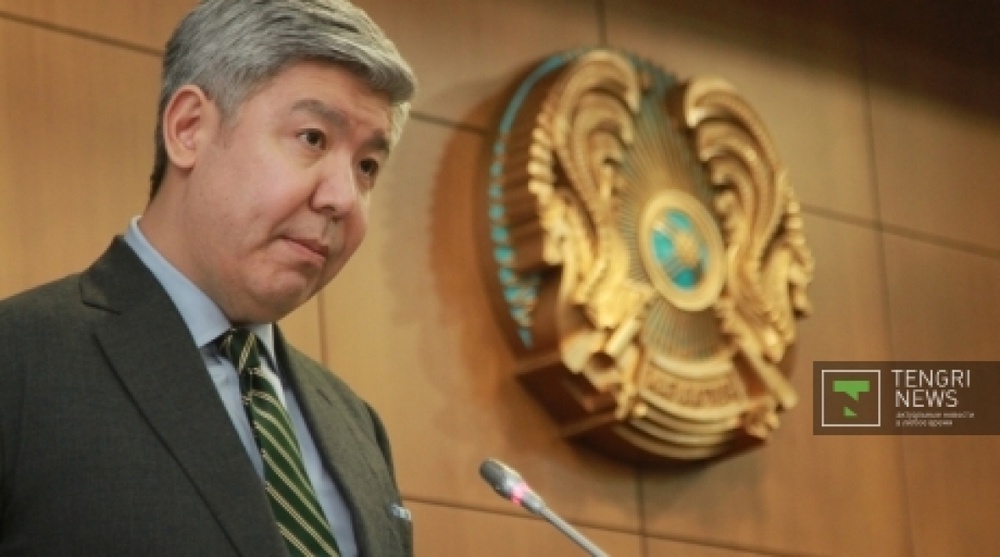
Kazakhstan Minister of Environmental Protection told about Kazakhstan’s ecological problems at the meeting with the representatives of non-government organizations, Tengrinews.kz reports. “The country accumulated over 100 million tons of solid domestic wastes, over 23 million tons of industrial wastes, including 12 technogenic mineral formations. They contain solid organic polluters: chrome and heavy metals, such as lead, cadmium and zinc,” Nurlan Kapparov said. The Minister noted that wastes recycling remains at the low level, despite of the annual growth of the wastes volume. Only 20 percent are utilized, whereas in developed countries 30 percent of waters are recycled. Over 2.5 million tons of sewage waters are discharged into the country’s rivers annually. “Water is not being recycled, the problem of access to fresh water is some regions is still acute,” he said. The air is annually polluted with 3 million tons of industrial wastes from 42 major companies. This is 65 percent of all the emissions in Kazakhstan. All this is apart from cars emissions that are heaviest in Almaty and Shymkent. 19 oil fields with 1,485 wells are located in the storm surge flood areas of the Caspian Sea. There are 90 of them in constant floods area. According to the Minister, they pose a serious threat for the sea. "We have to clearly understand how to fight possible oil spills at the Caspian Sea. There is no integral and integrated monitoring system at the Caspian Sea,” the Minister said. Desertification is becoming another disaster for Kazakhstan. Degraded and deserted lands make around 70 percent of the country. “26 million hectares out of 188 million hectares of lands have reached the extreme form of degradation. This is an irrecoverable damage to the nature,” Kapparov stated. Renewable energy sources, according to the Minister, are not being used or developed in Kazakhstan. Private business could have been involved, but there is no mechanism making such project feasible, he complained. The Ministry is planning to focus on major companies and significantly decrease the number of checks and audits of small and medium business and draw more attention to education problem: the country lacks professionals capable of ensuring ecological security at industrial facilities.





Kazakhstan Minister of Environmental Protection told about Kazakhstan’s ecological problems at the meeting with the representatives of non-government organizations, Tengrinews.kz reports.
“The country accumulated over 100 million tons of solid domestic wastes, over 23 million tons of industrial wastes, including 12 technogenic mineral formations. They contain solid organic polluters: chrome and heavy metals, such as lead, cadmium and zinc,” Nurlan Kapparov said.
The Minister noted that wastes recycling remains at the low level, despite of the annual growth of the wastes volume. Only 20 percent are utilized, whereas in developed countries 30 percent of waters are recycled. Over 2.5 million tons of sewage waters are discharged into the country’s rivers annually. “Water is not being recycled, the problem of access to fresh water is some regions is still acute,” he said.
The air is annually polluted with 3 million tons of industrial wastes from 42 major companies. This is 65 percent of all the emissions in Kazakhstan. All this is apart from cars emissions that are heaviest in Almaty and Shymkent.
19 oil fields with 1,485 wells are located in the storm surge flood areas of the Caspian Sea. There are 90 of them in constant floods area. According to the Minister, they pose a serious threat for the sea. "We have to clearly understand how to fight possible oil spills at the Caspian Sea. There is no integral and integrated monitoring system at the Caspian Sea,” the Minister said.
Desertification is becoming another disaster for Kazakhstan. Degraded and deserted lands make around 70 percent of the country. “26 million hectares out of 188 million hectares of lands have reached the extreme form of degradation. This is an irrecoverable damage to the nature,” Kapparov stated.
Renewable energy sources, according to the Minister, are not being used or developed in Kazakhstan. Private business could have been involved, but there is no mechanism making such project feasible, he complained. The Ministry is planning to focus on major companies and significantly decrease the number of checks and audits of small and medium business and draw more attention to education problem: the country lacks professionals capable of ensuring ecological security at industrial facilities.

 +7 (777) 001 44 99
+7 (777) 001 44 99



 Қазақша
Қазақша Русский
Русский English
English














































